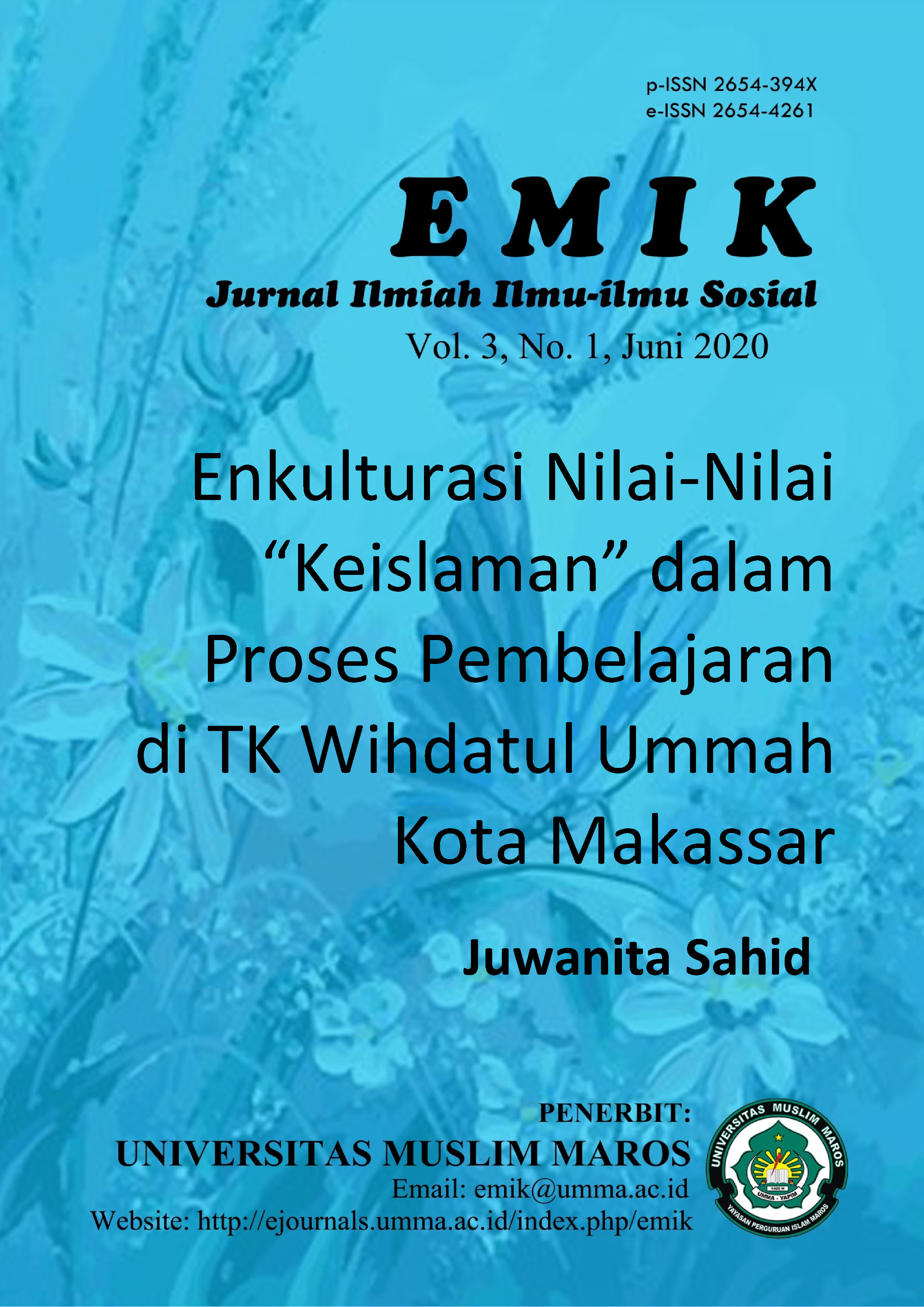Enkulturasi Nilai-Nilai “Keislaman” dalam Proses Pembelajaran di TK Wihdatul Ummah Kota Makassar
DOI:
https://doi.org/10.46918/emik.v3i1.494Keywords:
PAUD, Enculturation, Achievements, Curriculum, Islamic ValuesAbstract
Early childhood education (PAUD) is a social institution that serves to instill cultural, national, and religious values in children. While the existing literatures on PAUD are more focused on the role of social institutions and formal educational institutions in the formation of children (school environment, learning process and community supporting the process), this article focuses on the process of enculturation in applying "Islamic" values in the learning process at TK Wihdatul Ummah.
This study was conducted at TK Wihdatul Ummah. Using ethnographic approach, data was collcted using in-depth interview ansd observation. The study involved ten informants who are varied on the basis of age (between 27 and 69 years), and status, consisting of a school principals, three teachers, five parents and a student’ guardian.
The study shows that TK Wihdatul Ummah has succeeded in carrying out Wahdah Islamiyah's main mission in the field of education, mainly in developing young generation from an early age by fostering faith (aqidah), monotheism (tauhid), faith (iman) and good deeds (amal sholeh). Character building based on "Islamic" values is the main orientation that is encultured by TK Wihdatul Ummah to early childhood and still refers to the PAUD National Curriculum. TK Wihdatul Ummah has been able to transmit an "Islamic" curriculum that focuses on two core competencies, namely to love the Qur'an and the Hadith and practice Islamic values as the character of pious children. Achievement of competence to love the Qur'an and the Hadith is shown in basic competency activities, namely: memorizing the surahs in juz 30 and reciting the Hadiths of the Prophet, taddabur Al-Qur'an and Hadith, studying hijaiyyah letters, and knowing practical worship according to the guidance of the Prophet. While the attainment of the “Islamic” values as the character of pious children, is shown by Islamic behaviour in daily life, and Islamic independent behavior. Students’ learning achievements at TK Wihdatul Ummah include discipline, independence and self-confidence; trust and closeness to the teacher; able to socialize; able to appreciate and understand others; able to understand rewards and punishment; and able to practice Islamic values as sholeh children character. From the emic point of view based on emic perspective (teachers and parents), the achievement in terms of children character building at TK Wihdatul Ummah focuses on religious values (praying independently and according to guidance, worshiping and remembrancing) and morals values (getting used to behaving well, polite, honest, like to give/help and respect) and social emotional values (independence, self-confidence able to socialize, respect and understand others, control themselves naturally, understand the rules and discipline). By studying at TK Wihdatul Ummah, it is not only students, but also parents show significant changes in their everyday behaviour.
References
Abdullah, I. 2010. Konstruksi dan Reproduksi Kebudayaan. Yoyakarta: Pustaka Pelajar
Amini, Mukti. 2015. “Profil Keterlibatan Orang Tua Dalam Pendidikan Anak Usia TK”. Jurnal Ilmiah Visi PPTK PAUDNI, 10 (1): 9-20.
Bloom, B. S.; Engelhart, M.D.; Furst, E.J.; Hill, W.H.; dan Krathwohl, D.R. 1956. Taxonomy of Educational Objectives: Handbook 1, Cognitive Domain. New York: David McKay.
Bourdieu, P. 1985. “The Forms of Capital”, dalam Richardson, J.E. (ed.), Handbook of Theory of Research for the Sociology of Education. New York: Greenword Press, 46-58.
Harker, R., Mahar, C., dan Wilkes, C (ed). 1990. (Habitus x Modal) + Ranah = Praktik, Terj. oleh Pipit Mazier. Yogyakarta: Jalasutra.
Hodges, D. J. 2011. The Antropology of Education. New York (USA): Cognella.
Hunenengo, Novitasari. 2014. “Faktor-faktor yang mempengaruhi Perkembangan Sosial pada Anak Kelompok B PAUD Unggulan Mutiara Desa Dulamayo Kec Bongomene Kab Gorontalo”. Gorontalo: Fakultas Ilmu Pendidikan UN.
Jurdi, S. 2007. Sejarah Wahdah Islamiyah: Sebuah Geliat Ormas Islam di Era Transisi. Yogyakarta: Kreasi Wacana.
______. 2015. Borjuasi dan Borjuasi Kultural Dalam mengukir Sejarah Peradaban. Makassar: Alaudin Press.
Kurniasari, ND. 2015. “Pola Pembelajarn dan Pengasuhan Pendidikan Anak Usia Dini di PAUD Madura”. Komunikasi 9(2): 113-118.
Mansur. 2005. Pendidikan anak usia dini dalam Islam. Yogyakarta: Pustaka Pelajar.
Muller, J. 2006. Perkembangan Masyarakat Lintas-Ilmu. Jakarta: PT Gramedia Pustaka Utama.
Rolina, Nelva. 2004. PAUD Berbasis Pengembangan Karakter: Dasar Peningkatan Mutu Pendidikan Nasional. Yogyakarta: UNY.
Seda, F. S. 2012. “Kelas Menengah Indonesia: Gambaran Umum Konseptual”, Prisma. LP3ES, 3(31):3-13.
Tilaar, H.A.R. 1999. Pendidikan, Kebudayaan dan Masyarakat Madani Indonesia. Bandung: PT. Remaja Rosda Karya.
Yusuf, F.; Aries,S., Rumanda.,Y., dan Maryati, S. 2015. Pedoman Pengelolaan Kelas PAUD. Jakarta: Diterbitkan oleh Direktorat Pendidikan Anak Usia Dini.










9.png)















